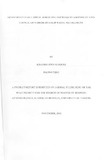| dc.description.abstract | This study sought to identify the determination of the capital investment appraisal technique used and determine the most commonly used capital investment appraisal technique by City Council of Nairobi in solid waste management. Data was collected using structured questionnaires circulated to the departments of finance, treasury and environment. Thirty (30) questionnaires were circulated but only nineteen (19) questionnaires were responded.
The analysis revealed that solid waste quantity, funds available and interest rates are the most common factors influencing the capital budgeting technique adopted by City Council of Nairobi.
All the respondents indicated that City Council of Nairobi has a capital investment policy which is followed most of the time. Further the identification of investment opportunity was identified as the first stage in capital investment process, followed by approval of the budgets.
Authorization of expenditure and control and monitoring of the projects were ranked fourth and fifth stage respectively in the capital investment process.
The main capital investment appraisal techniques used by City Council of Nairobi are the net present value (58%), the internal rate of return (26%) and the payback period (11%). The
discounted cashflow techniques are the most used capital budgeting investment appraisal techniques (75%) while the non-discounted cash flow techniques are used 25% of the time.
The results further indicated that determining the project period, cash outflow determination, length of time the decision is made and quantification of the solid waste were the most serious challenges the City Council of Nairobi faces in capital budgeting. The management skills and knowledge, interest rate determination and quantification of the solid waste were reported to be the least challenges faced in capital budgeting. The implication of these results is that the City Councils should endeavour to continuously assess whether they are receiving the appropriate return on their investment besides their goal of offering a clean and safe environment | en |

